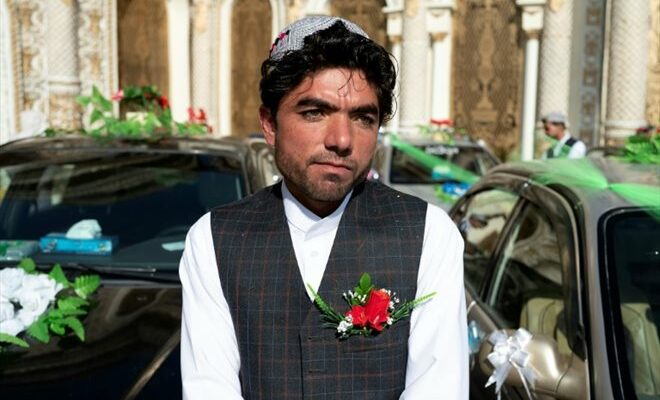Collective wedding ceremony in Kabul, December 25, 2023 in Afghanistan (AFP/Wakil KOHSAR)
Fifty couples were united collectively on Monday in a huge building in Kabul, an increasingly widespread practice to reduce the astronomical costs of traditional weddings in Afghanistan.
The imposing setting of the dozen “wedding halls” in Kabul lends itself to the new austerity of these ceremonies, in the Central Asian country in the midst of economic stagnation and under the tutelage of the Taliban.
Since the latter’s return to power in August 2021, the bride and groom and their families are no longer celebrating too much: music is de facto banned. Monday’s ceremony took place in the presence of numerous guards and Taliban armed with automatic rifles.
In front of the City Star, an imposing ecru building with columns and overloaded with gilding near Kabul airport, around a hundred turbaned men dressed in their finest traditional attire, the shalwar kameez, chat in groups in the absence of the lesser woman.
Young people finish decorating the cars with long fluorescent green ribbons and red plastic roses forming hearts.

Afghans decorate cars with green ribbons in front of a wedding hall during a collective wedding ceremony in Kabul, December 25, 2023 (AFP/Wakil KOHSAR)
Roohullah Rezayi, 18, who will leave with his wife in a few hours, explains to AFP that he had “no choice” because “it would have been difficult to meet the expenses”.
“A traditional wedding would have cost us at least 200,000 to 250,000 Afghanis (2,600 to 3,200 euros), but here it will be between 10,000 and 15,000 Afghanis” (130 to 195 euros), says the young man wearing a “hat of Kandahar” gray embroidered.
The Afghan from the Hazara minority from the province of Ghor (central-west) earns barely 350 Afghanis per day (five euros) with odd jobs.
“Here we invited 35 members of our two families, otherwise it would have been 300 to 400,” says the future groom, who sports plastic flowers in the breast pocket of his elegant sleeveless checkered vest, worn over a tunic immaculate white.
– Invisible brides-to-be –
The couples will take gifts for the start of their married life: a huge cake, a kit with toothpaste, shampoo and moisturizer. But above all a carpet, a blanket and household appliances.

Volunteers distribute bouquets of flowers to future brides and grooms during a collective wedding ceremony in Kabul, December 25, 2023 in Afghanistan (AFP/Wakil KOHSAR)
Donations to each couple from the Selab foundation, organizer of the event, are equivalent to 1,500 euros – an amount in one of the poorest countries in the world.
Hundreds of men wrapped in a “patou”, this large ecru or taupe woolen cloth, attended the ceremony in the immense room festooned with garlands but freezing.
After the recitations of the Koran, the speech of a Taliban official from the Ministry of Promotion of Virtue and Prevention of Vice was punctuated by cries of “Allah akbar” (God is greatest) from the audience, apparently a novelty in these marriages.
Throughout the ceremony, the brides-to-be remained invisible, confined with the women of their family in a wing of the City Star – as before the return of the Taliban.
But unlike previous collective marriages, journalists were unable to see, photograph or film the young women once married, whose faces are traditionally covered with a green and gold veil.
“For 13 years, the Selab foundation has been fighting against the culture of dowry which leaves you broke and competition (between families) in spending,” Sayed Ahmad Selab, its president, told journalists.

Future brides and grooms arrive for a collective wedding ceremony on December 25, 2023 in Kabul, Afghanistan (AFP/Wakil KOHSAR)
It is still not uncommon for weddings in Afghanistan to bring together more than 1,000 guests and cost 20,000 euros. A practice that shocks many Afghans in this very religious country.
For Monday’s mass wedding, 600 couples applied.
“We set 14 conditions,” explained the head of the Selab foundation: “notably that the fiancé is not a drug addict, mentally ill, unemployed, and that he earns at least between 300 and 500 Afghanis per day.”
– Three years of waiting –
For some lucky people this Monday, it took years of patience.
As for Samiullah Zamani, a 23-year-old farmer from the province of Kabul.

A future groom in front of cars decorated for a collective wedding ceremony, December 25, 2023 in Kabul (AFP/Wakil KOHSAR)
“I’ve been waiting for this day for three years!” says the young man, whose palm is decorated with henna.
“God bless Haji Selab, we didn’t have money to celebrate. It’s one of the happiest days of my life!”
Haji Badam, who is approaching 70, had new clothes made for the wedding of his grandson Sajid, who teaches in a madrassa.
In these “wedding halls” we don’t have “the attan (editor’s note: traditional Afghan dance) nor the music, but we still have them in the villages”, says the Afghan with the long white beard, bursting out laughing.
© 2023 AFP
Did you like this article ? Share it with your friends using the buttons below.




